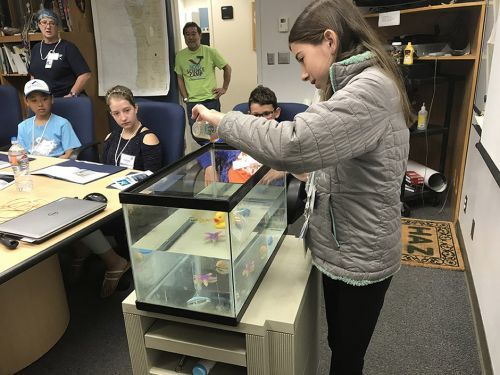Staff Participate in NOAA Science Camp in Seattle
July 26, 2017 - The U.S. Coast Guard announces a ship collision in Puget Sound off the Shilshole Bay. What happens now?
Trying to answer that question started the journey of participants in this year’s NOAA Science Camp. Washington Sea Grant organizes the popular camp and each year participants discover how NOAA oceanographers, biologists, chemists, physical scientists and others from the Office of Response and Restoration respond to hazardous spills.
More than 90 campers participated in 10 two-hour sessions during the two weeks of science camp, held July 10-21 at NOAA’s Western Regional Center in Seattle. Guided by staff from both the Emergency Response Division and the Assessment and Restoration Division campers explored answering the five questions our response and assessment staff ask during spill incidents:
- Where will the oil go?
- How will it behave in, on the water, and on different types of shorelines?
- What biological and human resources may be at risk during a spill?
- How might the oil adversely affect these resources?
- What can be done to help?
Camp participants learned what scientific data is gathered to answer those questions. They were also introduced to response tools like our GNOME modeling software, and Environmental Sensitivity Index maps.
Our staff also helped campers learn about pollutants from cars, homes, agriculture, and other types of land uses and the effects on the Puget Sound. In other lessons, campers simulated the flow of water and pollutants in the environment, using tabletop watershed models and building groundwater models. They then brainstormed methods to clean up, contain, and prevent watershed pollution.
In another session, campers rolled up their sleeves, donned lab googles and gloves and become aquatic toxicologists for a day, testing samples for toxic chemicals and water quality parameters and learned how to interpret their data.
Later in the week, campers had to a solve science mystery. They visited several NOAA offices to gather more information about various aspect of the scenario and then applied what they learned to test their hypotheses. Campers presented their findings and conclusions on the last day of camp each week and were evaluated by a scientist representative from each office.
Staff science camp instructors included Marla Steinhoff, Mark Dix, Dalina Thrift-Viveros, Dylan Righi, Chris Barker, Matthew Bissell, Gary Shigenaka, Nicolle Rutherford, Amy MacFadyen, and Rebecca Hoff.
Marla Steinhoff and Amy MacFadyen contributed to this article.
 An official website of the United States government.
An official website of the United States government. 
